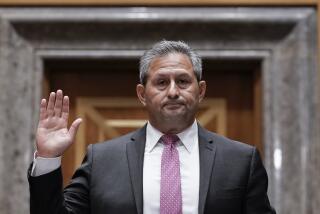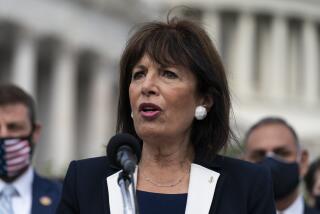Senator Says Inmate Was Isolated to Quiet Quayle Drug Allegations
- Share via
WASHINGTON — A Senate subcommittee chairman charged Friday that a federal prisoner was improperly placed in isolation on the eve of the 1988 presidential election to keep him from claiming that he sold marijuana to Dan Quayle in the 1970s.
Sen. Carl Levin (D-Mich.), chairman of a Governmental Affairs subcommittee, said Brett Kimberlin, a convicted drug smuggler and bomber, was ordered into the “hole” by the director of the U.S. Bureau of Prisons so that he could not tell reporters that he had sold marijuana to Quayle.
Levin said his staff concluded that J. Michael Quinlan, the prisons director, acted for “political purposes” after Bush-Quayle campaign officials expressed concerns about the potential impact of Kimberlin’s charges so close to the presidential election.
Levin said that he did not examine the validity of Kimberlin’s claims about the marijuana sales, which have been denied by Quayle and have never been corroborated.
A spokesman for Quinlan said that he would have no comment on Levin’s charges.
The subcommittee report is the latest episode in the Kimberlin-Quayle saga, which was chronicled last year in a controversial series of “Doonesbury” comic strips and is the subject of an article in the current New Yorker magazine.
Quayle has issued repeated statements saying he never met Kimberlin and never used drugs. Jeff Nesbit, his communications director, said Friday: “There’s absolutely nothing new here. We’ve mostly heard all this nonsense before.”
Kimberlin is serving a 50-year prison sentence for drug smuggling, perjury and setting off a series of bombs in the late 1970s in an Indianapolis suburb. One blast severely injured a Vietnam veteran, who later committed suicide.
In October and early November of 1988, he telephoned several reporters from prison in El Reno, Okla. He claimed that he had sold marijuana to Quayle several times while Quayle was a law student in Kimberlin’s hometown of Indianapolis.
Four days before the election, on Nov. 4, 1988, Kimberlin planned a prison press conference to air his charges.
El Reno officials had approved the press conference, but court records show that Quinlan canceled it and later that day ordered Kimberlin placed in isolation, which cut off his outside contacts.
Kimberlin filed a civil lawsuit against Quinlan, who is also a former Justice Department official.
He claims his rights were violated by the detention and a second stint in isolation three days later after he tried to hold a telephone press conference.
Quinlan has said he ordered the Nov. 4 isolation for Kimberlin’s safety after National Public Radio reporter Nina Totenberg purportedly said Kimberlin feared for his life. Totenberg, who was investigating Kimberlin’s marijuana claims, denied in a sworn deposition ever making such a statement.
Court records show that Bush-Quayle campaign officials had relayed their anxieties about Kimberlin’s allegations to Quinlan and the Justice Department. The officials also questioned whether prisoners should be allowed to hold press conferences.
“Whether these actions occurred on the independent initiative of Mr. Quinlan or other federal employees or at the request of the Bush-Quayle campaign is a question that remains unanswered,” Levin said.
More to Read
Get the L.A. Times Politics newsletter
Deeply reported insights into legislation, politics and policy from Sacramento, Washington and beyond. In your inbox twice per week.
You may occasionally receive promotional content from the Los Angeles Times.









